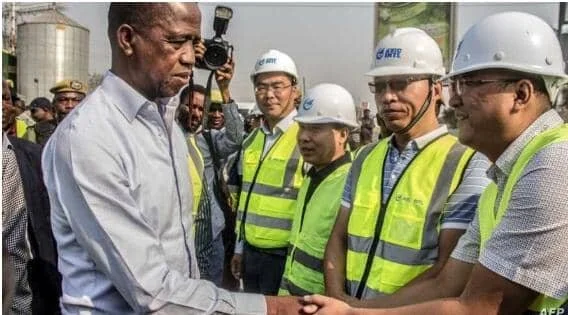The AU Must Learn From Zambia
Zambia’s creditors are voting today over whether to grant it a repayment pause on $3 billion of Eurobond debt. Transparency is a major sticking point. The creditors are demanding full information about Zambia’s whole loan portfolio, including all its loans to China. Without this information, they’re unlikely to grant any relief, which will put Zambia into default tomorrow.
Chinese lenders’ reluctance to release information about the loans comes (at least in part) from how the Chinese system operates. Transparency isn't a public norm in China. We saw this in action during the early days of the COVID-19 pandemic. There are very few incentives for full disclosure of pretty much anything, and many reasons for both individual officials and public institutions to remain tight-lipped.
Calls from Western governments for China to conform to Paris Club transparency standards, and the current G20 move (expected today) towards a common loan framework are laudable, but they’re not going to change the Chinese system overnight.
That said, Bradley Parks, the head of AidData, a research center at the College of William and Mary focusing on Chinese external funding, recently pointed out that there's a loophole in many Chinese loan agreements: Chinese loan data has to be released if the borrowing country’s laws demand it.
So here's my proposal: the opacity of these loans has facilitated corruption in Africa. The African Union loves paying lip service to anti-corruption (2018 was its Year of Anti-Corruption.) I propose that the African Union make full loan transparency the centerpiece of its anti-corruption campaign. This shouldn’t only be a general operating principle, it should be ratified by a formal agreement. The AU should also set up a public database of all major loans to African countries and push for all member countries to make full loan transparency national law.
Some of the legal groundwork for this kind of mechanism is already in place. For example, 2003’s African Union Convention on Preventing and Combating Corruption [PDF] prohibits conventions around secrecy in banking from being used to block transparency initiatives. It would also fit into wider initiatives towards continental economic and financial integration, as outlined in the AU’s Agenda 2063 development plan. In addition, seeing the full details of the loans would help African governments to make better deals in the future.
But of course, this leaves out one detail. Chinese officials aren’t the only ones with reasons to keep loan information secret. This is just as true for African officials, and I can well imagine this factor undermining my dream loan database.
But never let a good crisis go to waste, right? If the Zambia debacle doesn’t force a change in African borrowing practices, the AU can dump Agenda 2063 and all its dreams of development and economic integration out the window. The people of Zambia are going to suffer deeply because of the Lungu government’s decisions. If African leaders do nothing to prevent similar tragedies, they are the enemy of the African people and they have to go.
Three Things You Should Know
What To Do About the Lack of Chinese Loan Transparency in Africa?
One of the central issues in the current Zambian debt crisis is a lack of transparency that makes it largely impossible for investors, policymakers, and constituents on all sides to know what’s really going on.
The Chinese government and creditors are among the worst in this regard. Not only do they refuse to disclose critical information about loans, deals, and other issues that taxpayers both at home and in borrowing countries should know, but what little communication they do provide is often very confusing, even misleading.
It’s hard to tell, though, if the Chinese preference for obfuscation is deliberate and strategic, or if it reflects common practices in an authoritarian one-party state where government transparency is genuinely an alien concept. It’s important to remember that Chinese stakeholders possibly aren’t forthcoming about their dealings in regions like Africa because they don’t come from a culture where that’s valued. (READ MORE)No Excuses. China Exim Bank Rejects Uganda’s Appeal For Repayment Delay
Back in August, the Ugandan government asked the China Exim Bank for a repayment delay on the loans needed to build the $1.7 billion Karuma dam project. A week went by and the bank replied with a simple answer: no.
The government had requested the repayment delay because completing the dam’s construction may be delayed by as much as 7 months.
In a letter dated August 25, which was sent to a number of high-level Ugandan officials and recently became public, the bank basically said that’s not their problem and the government is obligated under the agreement to repay its debts. (READ MORE)Why Kenya’s Standard Gauge Railway Was Doomed From the Start
Kenya’s new multi-billion dollar standard gauge railway (SGR) was destined to fail even before it launched, argued Kenyan legal scholar Luis Franceschi in a new opinion column in the Nation newspaper. Franceschi joins a growing number of analysts who have long asserted that the railway was built using a faulty business plan and was never going to be able to generate the revenue needed to repay the loans.
Last month, Ian Taylor, a well-known China-Africa scholar at the University of St. Andrews reached a similar conclusion in a paper that he published in African Studies Quarterly.
Both scholars note that government planners predicated the feasibility study on the SGR nearly doubling its current cargo transport volumes, which would have been nearly impossible under normal circumstances and inconceivable now amid the ongoing pandemic.
The views and opinions expressed here belong to the author or interviewee and do not necessarily reflect those of The Youth Cafe


